#Egisto Macchi
Text



Egisto MACCHI
"Sei Composizioni"
(LP. Gemelli. 1975) [IT]
youtube
12 notes
·
View notes
Text
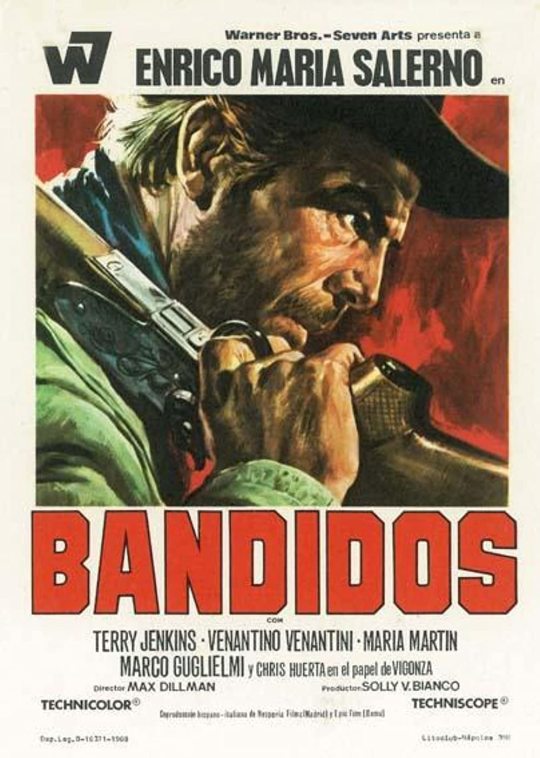

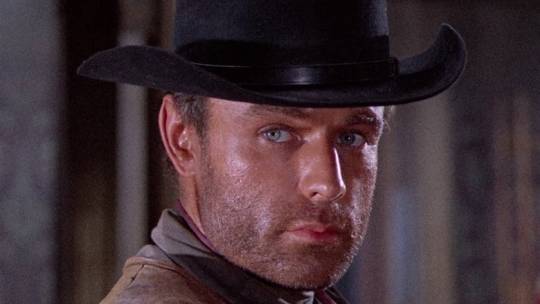
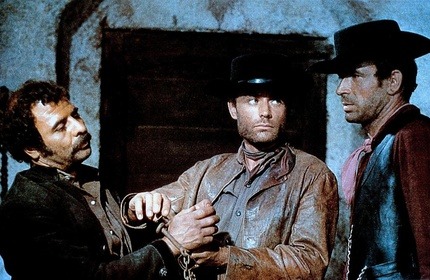



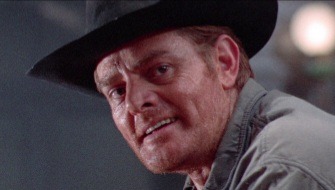

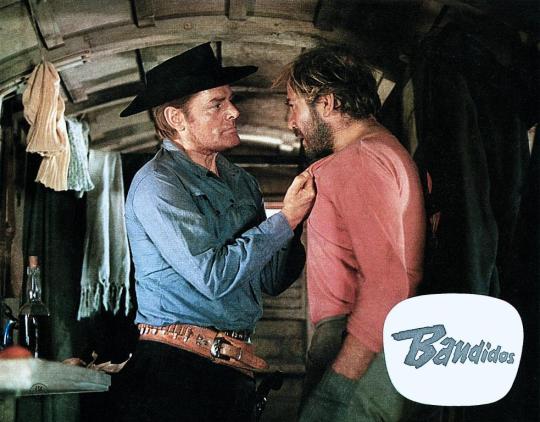
Bandidos (Guns of Death, 1967)
"You've been a good teacher."
"A good teacher doesn't teach you to kill."
#bandidos#guns of death#italian cinema#spaghetti western#1967#massimo dallamano#romano migliorini#juan cobos#enrico maria salerno#terry jenkins#maría martín#venantino venantini#marco guglielmi#cris huerta#massimo sarchielli#jesús puente#antonio pica#roberto messina#egisto macchi#although he'd worked as a cinematographer for the best part of a decade (including on Leone's Dollars trilogy) this was Dallamano's first#film as director (and his only western; he's better remembered now for his work in gialli and horror films). it's an extraordinary debut‚ a#visual tour de force with a craftsman's eye for detail and some inventive editing flourishes (of note is an unnervingly long pan across the#aftermath of a train massacre in the opening scene). hyper violent‚ but not flippant with it; the film has a body count to rival most war#films‚ but it's rarely meaningless and is given appropriate weight. Salerno gives a typically strong performance as the marksman legend#whose wounded hands prevent him from getting the revenge he burns for (a typically romantic conceit for the genre) and Venantini is#wonderfully‚ maliciously other worldly as the nemesis who more closely resembles a demonic apparition than a bandit.#it may not have the universal appeal of some of the biggest films within the genre‚ but this is a punchy‚ sharply shot blood soaked#vengeance thriller with some unexpected pathos and real emotional heft‚ and some remarkably unexpected moments#not least the mortally wounded gunman‚ suddenly transfixed by a reproduction of The Death of Sardanapalus‚ seized by the insane#notion of bringing some of the surrounding women with him on his journey to hell; it's the kind of thing you just don't get in every film
4 notes
·
View notes
Text
commiato dal musicista antonello neri
Il commiato dal musicista Antonello Neri, scomparso il 28 maggio, si terrà domani, martedì 30 maggio alle ore 15 al tempietto egizio del Verano, dove sarà proiettato il documentario Antonello Neri, di suo figlio Federico Ayrton.
Antonello Neri: Iren – ImprovvisAzioni vesuviane (29 maggio 2010)
Konsequenz (KNZ012)
Musica e pianoforte: Antonello Neri
Fair…
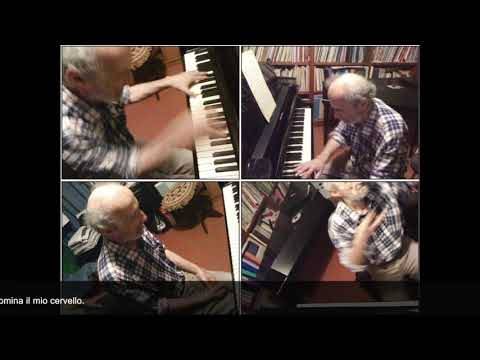
View On WordPress
#Alessandro Sbordoni#Antonello Neri#Associazione musicale “Ferenc Liszt”#Beat 72#commiato#Egisto Macchi#Ennio Morricone#Federico Ayrton Neri#Franco Evangelisti#Giancarlo Schiaffini#Giovanni Piazza#Girolamo De Simone#Gruppo di Improvvisazione Nuova Consonanza#I Solisti di Roma#Iren#Iren - ImprovvisAzioni vesuviane#Iren 1-2-3-4#Luca Bortolotti#Massimo Coen#Mauro Bortolotti#music#musica#Nuova Consonanza#obituary#ricordo#Teatro degli Artisti#Teatro Politecnico
0 notes
Audio
Andrea Belfi - Eternally Frozen - more low winds (see Jessica Pipe Sextet) but in this case they’re brass rather than reed instruments
Eternally Frozen consists of a series of canon based compositions for brass ensemble, percussion and synthesizer by Andrea Belfi. The canon is an ancient compositional technique in which an initial melody is imitated at a specified time interval by one or more parts, creating illusionary never-ending musical journeys.
The work is inspired by the evocative image of the Deprong Mori, a mythological bat with the alleged ability to fly through solid matter by bending atoms by it’s natural skill of audio echolocation. The myth suggests that one of these bats had been “eternally frozen” in a wall of solid lead in 1952 by the researcher of the Rockefeller University, Donald R. Griffith. This story is exhibited in a display at the Museum of Jurassic Technology in Los Angeles, an institution renowned for both speculative, fantastical reinforcement of mythology and playful and beguiling distortions of mysterious could-be truths.
Both the canon and the “frozen” Deprong Mori are man-made illusory simulations of eternity. Their attempt is to create mirages, where the insinuation of facts is more meaningful than the reality.
After many years of sonic explorations with percussion, drums, and electronics, Belfi is here projecting himself as a composer through the direction of an astonishing brass ensemble in the realization of these canonic works. There are evident echoes of the works of Arthur Russell, Miles Davis, Moondog, William Basinski, and the Italian soundtrack tradition of Ennio Morricone and Egisto Macchi.
Robin Hayward - Tuba
Henrik Munkeby Nørstebø - Trombone
Elena Kakailogu - French Horn
Kaleidoskop Ensemble (Boram Lie, Ildiko Ludwig, Anna Faber, Mia Bodet, Mari Sawada, Yodfat Miron, Isabelle Klemt, Daniella Strasfogel): strings and choir on 1
Elisabetta Porcinai: cover art and design
#Andrea Belfi#brass#experimental#electronic#modern classical#chamber music#electroacoustic#maple death records#2023
3 notes
·
View notes
Photo

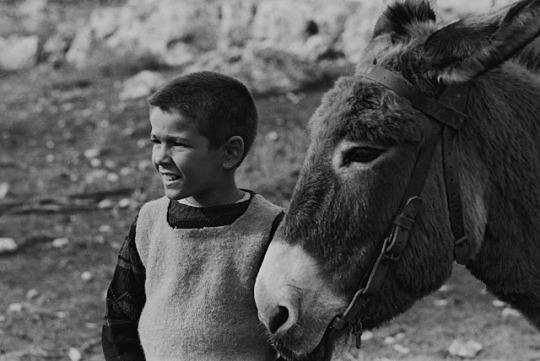
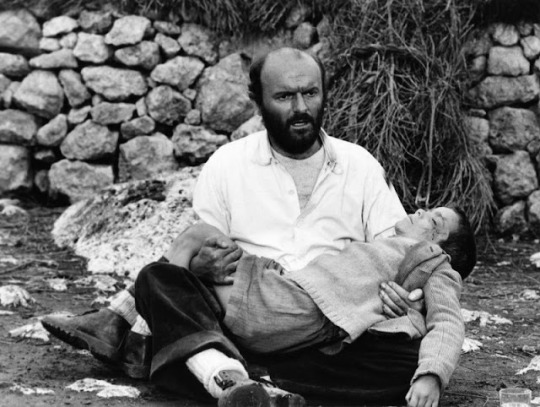
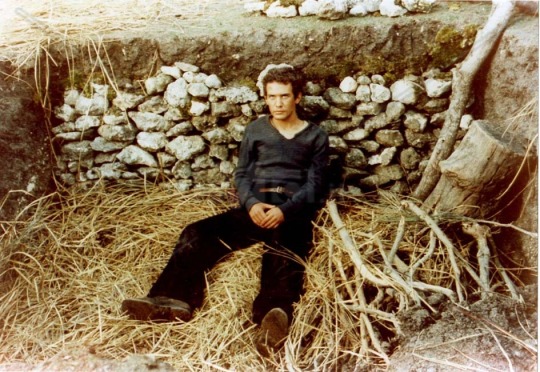
Padre Padrone (Paolo Taviani, Vittorio Taviani, 1977)
Cast: Omero Antonutti, Saverio Marconi, Marcella Michelangeli, Fabrizio Forte, Marino Cenna, Stanko Molnar, Nanni Moretti, Gavino Ledda. Screenplay: Paolo Taviani, Vittorio Taviani, based on a book by Gavino Ledda. Cinematography: Marino Masini. Production design: Gianni Sbarra. Film editing: Roberto Perpignani. Music: Egisto Macchi.
Two great themes coalesce in Padre Padrone. One is older than Oedipus, the primal conflict of father and son. The other came to the fore in the Enlightenment and the democratic revolutions it spawned; we now call it "social mobility." Poets used to write of flowers "born to blush unseen" and "mute inglorious Milton[s]," the victims of rural isolation, primitive ignorance, societies atrophied in feudal patriarchy. The Tavianis find both themes surviving in rural Sardinia, where Gavino Ledda's father drags him from school at the age of 6 and keeps him in servitude and illiteracy as a shepherd for the next 14 years. Padre Padrone could have been just a feel-good story about Gavino's triumph over his father's sternness and greed -- though the elder Ledda thinks what he's doing is for the son's own good -- but the Tavianis won't let it be just that. Though Gavino, rescued by compulsory military service from isolation and ignorance, becomes a celebrated linguist, an authority on the Sardinian dialect, the actual Gavino Ledda, appearing in a frame story for the dramatized part of the film, lets it be known that he has been permanently marked by his father. The Tavianis also find witty ways of letting the outside world irrupt into the young Gavino's isolation, as when the young shepherd hears an accordion playing and the soundtrack bursts into the overture from Die Fledermaus, a correlative for the world beyond the Sardinian hills. Later, after Gavino has begun to find his vocation but has been forced to return home, the aching beauty of the adagio from Mozart's Clarinet Concerto, to which Gavino is listening, is stifled when the father angrily drowns the radio in the sink. Gavino's feeling of being suppressed by his father finds a correlative when he joins a group of other young men carrying the effigy of a saint to a festival at the church. Hidden underneath the heavy statue, the men plot an escape to be guest-workers in Germany, but the camera pans up to the statue, which has changed to an image of Gavino's father, whose refusal to sign the necessary papers prevents Gavino from fleeing. Padre Padrone was made for Italian TV, and has been restored from 16mm film, so its images are sometimes a little muddy, but it gains real power from its storytelling and from the performances of Omero Antonutti as the father and Saverio Marconi as the grownup Gavino.
3 notes
·
View notes
Note
🪆 hi moon!!
HI HELLO
an innis sigh by the rankins (and maaany other people)
m'lover by kishi bashi
conversazione by mina
the lament of eustace scrubb by the oh hellos
arte sacra by egisto macchi
1 note
·
View note
Audio
Listen/purchase: Egisto Macchi - IL DESERTO by Cinedelic
1 note
·
View note
Text
Storm Stereo #89: Visionari Radicali
We journey through 50 years of Italian composing and experimenting. No talking, only music. Featuring minimal electronics, hypnotic drones, warm ambient, mystique concrète & more. From Pietro Grossi & Egisto Macchi to Ruscigan & Alessandro Alessandroni.
Italians do it better, clockwise from top left: Pietro Grossi, Egisto Macchi, Alessandro Alessandroni, Piero Umiliani
On this show we take a step back from talking and let the music speak for itself, as we take a journey through 50 years of Italian composing and experimenting. We listen to influential artists who helped shape the superior Italian sound and contemporary acts that continue to live…

View On WordPress
#alessandro alessandroni#computer music#electroacoustic tape music#electronic#experimental#italian composers#italian electronic#italian music#Italians do it better#library music#minimal#musique concrete#piero umiliani#pietro grossi#soundtrack music#Storm Stereo
1 note
·
View note
Text
Egisto Macchi – Città notte
Egisto Macchi – Città notte
Italy, 1972, library music / avant-folk / chamber music
Beautiful, nuanced, subdued. What is it with Italians making some of the best Library Music? This has so much texture, with brass squawking like dying birds and strings droning in sustained swells, all within an electronic soundscape.
youtube
View On WordPress
0 notes
Photo


Gruppo di Improvvisazione Nuova Consonanza, Musica su schemi, CRSLP 6109, «nova musicha» 9, Cramps Records, 1976 [Fondazione Bonotto, Molvena (VI)]
#graphic design#typography#art#music#music album#vinyl#cover#gruppo di improvvisazione nuova consonanza#gianni sassi#sergio marcotulli#giovanni piazza#egisto macchi#antonello neri#franco evangelisti#ennio morricone#nova musicha#cramps records#1970s
28 notes
·
View notes
Text



Egisto MACCHI
"Pittura contemporanea / Pittura moderna n°1 & n°2"
(3LP box. Cinedelic rcds. 2016 / rec. 1975) [IT]
youtube
11 notes
·
View notes
Photo

La Canta delle Marane, Cecilia Mangini (1961)
10 notes
·
View notes
Video
youtube
Egisto Macchi - La cella
2 notes
·
View notes
Audio
Andrea Belfi - Eternally Frozen - Bathe your ears in the mellow sonority of strictly low-end brass - tuba, trombone, & French horn
Eternally Frozen consists of a series of canon based compositions for brass ensemble, percussion and synthesizer by Andrea Belfi. The canon is an ancient compositional technique in which an initial melody is imitated at a specified time interval by one or more parts, creating illusionary never-ending musical journeys.
The work is inspired by the evocative image of the Deprong Mori, a mythological bat with the alleged ability to fly through solid matter by bending atoms by its natural skill of audio echolocation. The myth suggests that one of these bats had been “eternally frozen” in a wall of solid lead in 1952 by the researcher of the Rockefeller University, Donald R. Griffith. This story is exhibited in a display at the Museum of Jurassic Technology in Los Angeles, an institution renowned for both speculative, fantastical reinforcement of mythology and playful and beguiling distortions of mysterious could-be truths.
Both the canon and the “frozen” Deprong Mori are man-made illusory simulations of eternity. Their attempt is to create mirages, where the insinuation of facts is more meaningful than the reality.
After many years of sonic explorations with percussion, drums, and electronics, Belfi is here projecting himself as a composer through the direction of an astonishing brass ensemble in the realization of these canonic works. There are evident echoes of the works of Arthur Russell, Miles Davis, Moondog, William Basinski, and the Italian soundtrack tradition of Ennio Morricone and Egisto Macchi.
The brass ensemble consists of Robin Hayward - Tuba, Henrik Munkeby Nørstebø - Trombone, Elena Kakaliagou - French Horn. The three of them have a long list of prestigious collaborations in the experimental music world, including artists and composers such as Eliane Radigue, Ellen Arkbro, Phill Niblock.
6 notes
·
View notes
Video
youtube
from Dolce Russia (1983)
1 note
·
View note